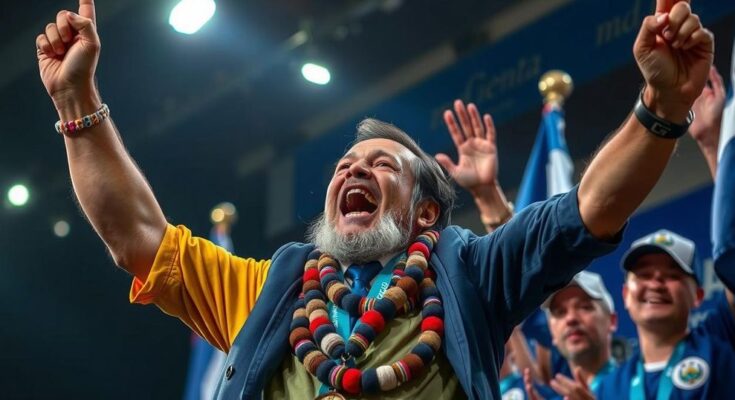Yamandu Orsi wins Uruguay’s presidential run-off election, defeating Alvaro Delgado and restoring the Broad Front to power. Orsi’s victory emphasizes a shift towards leftist policies, addressing economic disparities and security concerns that resonate with the electorate following eight years of right-wing leadership.
Yamandu Orsi, representing the left-wing Broad Front coalition, has triumphed in Uruguay’s run-off presidential election, defeating Alvaro Delgado of the ruling National Party in a closely contested race. Orsi’s victory marks a significant political shift, restoring the Broad Front to power after their prior tenure from 2005 to 2020, which ended with the election of President Luis Lacalle Pou. Following the announcement of the results, Orsi’s supporters rejoiced in the streets of Montevideo, celebrating the anticipated return of the Broad Front administration.
In his victory speech, Orsi expressed his commitment to enhancing Uruguay’s economy and addressing pressing social issues, including poverty and insecurity. He emphasized the necessity of policy reforms aimed at increasing purchasing power for low-wage workers and strengthening law enforcement. Despite a contentious race, Orsi’s decisive win signifies a rejection of the current right-wing government and an embrace of the progressive ideals the Broad Front stands for.
The electoral landscape in Uruguay was characterized by heightened tensions, with significant concern among voters regarding security and economic stability. The run-off election was necessitated after Orsi garnered 44% of the votes in the first round, failing to secure an outright majority against Delgado’s 27%. However, the Broad Front’s campaign, bolstered by the endorsement of former President Jose Mujica, ultimately resonated with the electorate, paving the way for Orsi’s leadership.
The recent presidential elections in Uruguay serve as a pivotal moment in the country’s political landscape. The left-wing Broad Front held the presidency from 2005 until 2020, when Luis Lacalle Pou, backed by a coalition of right-leaning parties, assumed office. Under Uruguayan law, Lacalle Pou could not run for a consecutive term, which prompted his party to nominate Alvaro Delgado for the presidency. In contrast, the Broad Front sought to regain power, addressing critical issues such as economic disparity and public safety that resonated with voters, particularly in light of the recent polling data indicating that insecurity had become a primary concern among the population. Orsi’s return to leadership can be seen as a reflection of the citizens’ desire for progressive governance and effective solutions to their pressing challenges.
Yamandu Orsi’s victory in the Uruguayan presidential run-off signals a notable political shift towards the left and a restoration of the Broad Front’s influence after several years of right-wing governance. His commitment to economic reform, enhanced security measures, and social equity resonates strongly with the electorate’s concerns. The transition from President Lacalle Pou to Orsi invites a renewed focus on progressive policies in Uruguay, marking a new chapter in the nation’s governance.
Original Source: www.aljazeera.com




